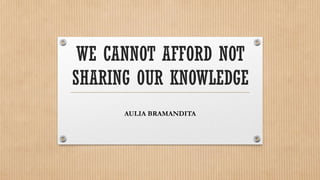
We cannot afford not sharing our knowledge
- 1. WE CANNOT AFFORD NOT SHARING OUR KNOWLEDGE AULIA BRAMANDITA
- 2. PARADIGM ABOUT KNOWLEDGE SHARING Old Paradigm New Paradigm SHARING KNOWLEDGE KNOWLEDGE IS IS POWER POWER
- 3. IMPORTANCE OF KNOWLEDGE SHARING Fact that it is essential to convince the corporate culture that everyone could benefit from knowledge sharing
- 4. THE NEED OF KNOWLEDGE MANAGEMENT • “Knowledge has become the key resource, for a nation’s military strength as well as for its economic strength… is fundamentally different from the traditional key resources of the economist – land, labor, and even capital…we need systematic work on the quality of knowledge and the productivity of knowledge… the performance capacity, if not the survival, of any organization in the knowledge society will come increasingly to depend on those two factors” [Drucker,1994]
- 5. KNOWLEDGE Knowledge is information possessed in the mind of individuals Knowledge is related to facts, procedures, concepts, interpretations, ideas, observations and judgment’s Knowledge is the result of cognitive processing triggered by the inflow of new stimuli
- 6. KNOWLEDGE COMPONENTS PEOPLE attitudes, sharing, innovation, skills, teamwork, motivation, vision PROCESS TECHNOLOGY workflows, integration, data best stores, networks, intern practices, business et, data mining, decision intelligence tools
- 7. • Intangible products - ideas, processes, information are taking a growing share of global trade • Increasingly the only sustainable competitive advantage is continuous innovation (application of new knowledge) • "Our problem as an organization is that we don't know what we know". Expertise learnt and applied in one part of the organization is not leveraged in another. • Increasing turnover of staff. When someone leaves an organization their knowledge walks out of the door with them.
- 8. • The amount of time spent to experience and acquire knowledge has reduced sharply • Strategic changing direction may lead to loss of knowledge • Accelerating change - technology, business and social. As things change so does our knowledge base • Reductions in human resources will create a need to replace informal knowledge with formal methods
- 9. WHY KNOWLEDGE SHARING ARE REQUIRED The amount of information and knowledge is growing vastly, due to the today’s growth of ICT. A necessary consequence of the increasing pool of knowledge is increased specialization. No one can keep with all new developments within this broad range of required competencies. Then, specialization is required. Consequence of the explosion of knowledge is that education no longer should be regarded as a phase life, but rather as a life-long experience.
- 10. MOTIVATING KNOWLEDGE SHARING • Knowledge is a perishable. It is becoming short-lived. If we do not make use of our knowledge then it will loses its value. • Even with the low level of knowledge sharing – if we do not make our knowledge productive than someone else with that same knowledge will do. • By sharing our knowledge, we will gain more then we will lose. Sharing knowledge is a synergistic process – we get more out than we give in. • To get most things done in an organization today requires a collaborative effort.
- 11. KNOWLEDGE SHARING: CONCEPTUAL FRAMEWORK Primary tools to practicing knowledge management Organizational technology Dynamics Process Engineering
- 12. KNOWLEDGE SHARING PROCESS Knowledge Creation Apply Knowledge Store Knowledge Distribute Transfer Knowledge
- 13. THE ROLE OF TECHNOLOGY (1/2) • Some people believe that we do not need technology to implement Knowledge Management. For some level, they might be right - Knowledge Management is basically about people. Yet, there is no way that we can share knowledge effectively within an organization without technology. • Technology plays an important role and crucial part of changing the corporate culture to knowledge sharing. In lot ways, it is technology that made knowledge sharing take place. • If well implemented and if people are trained and educated about its use, knowledge sharing technology is definitely useful.
- 14. THE ROLE OF TECHNOLOGY (2/2) • Accommodates knowledge sharing process and communication • Allows sharing the knowledge to multiple persons simultaneously • Offers a variety of services to the sharing process • Integrates organization systems and networks
- 15. BARRIERS TO KNOWLEDGE SHARING IMPLEMENTATIONS • Psychological fear of IT • Lack of understanding of the power of Knowledge Management • Unsuitable decision-making and management structure • Lack of simple and user friendly implementation tools • IT cannot solve what is essentially a management problem (store human intelligence and experience)
- 16. ISSUES ON KNOWLEDGE SHARING • “Effective KM is not about making a choice between “software vs. wetware, classroom vs. hands-on, formal vs. informal, technical vs. social…uses all the options available to motivated employees to put knowledge to work …[and] depends on recognizing that all of these options basically need each other” [Stewart, 2002].
- 17. BENEFITS OF KNOWLEDGE SHARING • Keep innovating by encouraging the free flow of ideas • Help in understanding markets and customers • Development of product and services • Development of vision and strategies
- 18. BENEFITS OF KNOWLEDGE SHARING • Reduce costs by eliminating redundant or unnecessary processes • Enhance employee retention rates by recognizing the value of employee's knowledge
- 19. SUMMARY • The most effective way to create a knowledge sharing culture – is first to start to practice it at our level. The higher up the organization the more effective will be in creating the culture. Second, put in place the knowledge sharing technology and train & educate people in its effective use. • Knowledge sharing as a concept is very attractive and provides massive business opportunities that must not be missed. It is core that transforms knowledge into economic value. Learning from past mistakes, time will change and takes knowledge sharing as the concept in the right direction and obtain its benefits to the fullest.
- 20. “ An investment in knowledge pays the best interest ” Benjamin Franklin THANK YOU !
